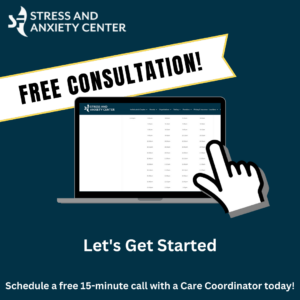The last few years have been hard on everyone’s mental health. According to a recent report by the Pew Research Center, 41% of U.S. adults have experienced high levels of psychological distress at some point from March 2020 to September 2022. Young adults, ages 18 to 29, were even harder hit, with 58% reporting high psychological distress at least once in that time. The silver lining is that people are becoming more aware of the need to care for their mental health—with an estimated 1 in 5 Americans living with mental illness per the National Institute of Mental Health, it’s a timely reminder for anyone struggling with a challenging situation or negative thoughts that seeking help is a good idea when you’re finding it difficult to cope on your own. Psychotherapy is an effective way to help resolve issues and treat mental health conditions, but people may not have an accurate idea of what it really is and the positive difference it can make.
What Is Psychotherapy and How Does It Work?
Psychotherapy, also known as “talk therapy,” is a broad term for treatment to improve mental health by talking to a mental health professional such as a psychologist, counselor, or other licensed practitioner. Therapeutic approaches that fall under this general umbrella term are intended to help people identify unhealthy emotions, thoughts, and behaviors and learn to replace them with healthy coping skills that improve their ability to function and their well-being. While psychotherapy is recommended for depression, anxiety, personality disorders, eating disorders, and a wide range of other mental health conditions, it can also help people adjust to life changes and stresses that they are finding difficult to manage.
There are many different types of psychotherapy, such as cognitive behavioral therapy (CBT), dialectical behavior therapy (DBT), interpersonal therapy, acceptance and commitment therapy and more. Many therapists specialize in one type or blend elements from different approaches to best serve their patients. Psychologists, licensed marriage and family therapists, licensed professional clinical counselors, and licensed clinical social workers are among the mental health professionals qualified to provide psychotherapy.
In addition to individual therapy, psychotherapy can also help when the difficulty lies in a relationship, as in couples therapy or family therapy. In these cases, work is centered around improving communication and patterns of interaction between partners or family members, rather than focusing on one person. Group therapy, in which a therapist leads a group of unrelated people often dealing with similar troubling issues or experiences, is another option. For example, a bereavement group can help participants feel less alone when dealing with the loss of a loved one, while benefiting from the professional guidance of a therapist who can advise them on navigating the grief process. The type of therapy that will be right for you is highly individual—the best measure is what makes you feel comfortable and what works to improve your quality of life.
What Is the Goal of Psychotherapy?
While the specific goals of psychotherapy will vary from person to person, depending on what situation brought them to therapy, the purpose overall is to treat mental disorders and emotional challenges through psychological means. Through conversations with a therapist, the patient gains a better understanding of themselves, learns to change behaviors that are preventing them from living the life they want, and develops healthy coping mechanisms to meet life’s challenges.
How long that takes depends on each case: some patients need only a limited number of sessions to deal with a specific issue, while others who are faced with a chronic condition or complex, long-standing situations may benefit from long-term treatment. The goals you and your therapist set will help determine the treatment plan that is best for you.
How Effective Is Psychotherapy?
Studies indicate that 75% of people who receive psychotherapy benefit from it. Research also shows that psychotherapy is equally effective whether it is delivered through in-person sessions or remotely, via teletherapy. This means that busy schedules and/or limits to how far you can travel to see the right therapist don’t have to be a barrier to getting the help you need.
Of course, psychotherapy requires active, willing participation to be most effective. During treatment, you’ll be learning new ways of looking at difficult situations and new skills for resolving them—attending appointments regularly, completing homework assignments between sessions, and practicing what you’ve learned will help your therapy have the greatest positive effect.
Investing in Your Well-Being
Psychotherapy can help alleviate mental suffering and lay the groundwork for living a healthier, happier life. If you’re ready to make a positive change, the compassionate Care Coordinators at SF Stress can help. With a free complimentary phone consultation, they’ll match you with one of our more than 40 qualified therapists for in-person therapy in one of our California locations or online therapy via a secure, HIPAA-compliant platform. Schedule your free consultation today to get started.




